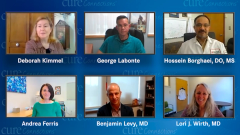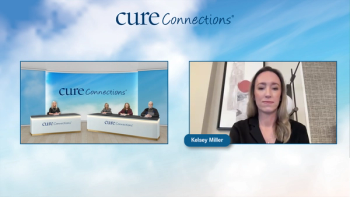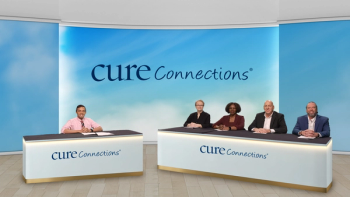
Waiting for Results and Processing Information From Biomarker Testing
Cancer patients, Deborah and George, reflect on their emotions while waiting to receive back results from biomarker testing and explain what it was like processing the information delivered by their test results as presented by their oncologists.
Episodes in this series

Hossein Borghaei, DO, MS: Let me go back to Ms. Kimmel now with some similar questions. Had you heard of biomarker testing before? When you met with Dr [Benjamin] Levy and he went over the diagnosis and he said we have to do this molecular testing, what was the conversation like? What kind of questions did you have for him?
Deborah Kimmel: I had not heard of biomarker testing. Dr Levy probably figured out pretty quickly that in biology class I was the student sitting in the back reading “Anna Karenina.” I knew nothing about biology, molecules, and frankly that’s it. I’m sure Dr Levy and Dr [Lori] Wirth know this, that when you’re giving a patient a cancer diagnosis, you have to read the patient. First, you have to have an intellectual understanding of the situation; that’s one spectrum. Then you have an emotional readiness to receive information; that’s another spectrum. Emotionally I was probably OK. I don’t think I was totally freaked out, although Dr Levy can answer that better than I. But intellectually, it was like being dropped in a foreign land where I didn’t speak the language. The alphabet soup, none of it really meant anything.
Of course, I did what George Labonte did which it’s so annoying when doctors say to you, don’t look at the Internet, because of course, the first thing you’re going to do is go look at the Internet. What you really need are guidelines and Internet locations that are credible or good sources of information, so you can learn. Because nobody who gets a cancer diagnosis is going to go to the first computer they can find and look up their cancer to find out how bad it’s going to be. That’s just reality. I didn’t know it. Dr Levy prescribed it. He has been the boss. Like George’s wife, my husband has been my caregiver, and my rock. He didn’t object, so I was there.
Hossein Borghaei, DO, MS: When Dr Levy said that you have to wait for the testing, was that time period to wait for more testing something that you were OK with?
Deborah Kimmel: No, it’s appalling. My answer to a two-week testing window was not how to position the patient’s expectations; it’s how to shorten the window. I don’t know why you would spend time talking about how you’re going to make it a more palatable message to the patient. I’d be going back to the testing providers and saying, “Hey, how can we start shaving days off those results?” I’m pushy like that.
Hossein Borghaei, DO, MS: We like that because sometimes you need that. Mr. Labonte, what about you? Your story was a little different in that you knew you had the RET, but there were no drugs available. When you were waiting for all this, going from one visit to another waiting for the test results, how did you find all that turnaround time?
George Labonte: As I said, the somatic testing and waiting really concerned me. I remember Dr Wirth even saying that there are no drugs right now, but it can help for a future treatment, which obviously she was right about. It was more the familial, the genetic testing, which is just single blood. It was, as Deborah said, appalling that I had to wait. It was a week and a half to find out that I didn’t pass it on to my children.
Hossein Borghaei, DO, MS: When the results were available, what was that conversation like? How did you receive that message? What was your impression when you heard about the molecular testing results?
George Labonte: With the familial, it was the genetic counselor that called me. I remember for that week and a half, I had my phone right by me the whole time, but somehow I missed the call. I had to call her back, but fortunately she was still there. That was obviously very relieving when she told me it was sporadic and my children had just as much chance as anyone else has of getting cancer. But when the RET came back, honestly I just said, “OK.” I didn’t really know enough about it to know that it would be so crucial for treatments. The trial that I’m on now, prior to this there were the TKI [tyrosine kinase inhibitors] treatments, but they had some pretty severe side effects. With this treatment I’m on now, I have zero adverse effects. In fact, I’m an avid runner. I ran the Boston Marathon last year, and I’m running the Boston Marathon this year. It was a game changer that I had this biomarker testing to begin with, to know that I could have treatments that, I’d say, gave me my life back. I want to take advantage of the health I have, which is why I stay healthy.
Hossein Borghaei, DO, MS: That’s very impressive, and I’m happy for you.
This transcript has been edited for clarity.


